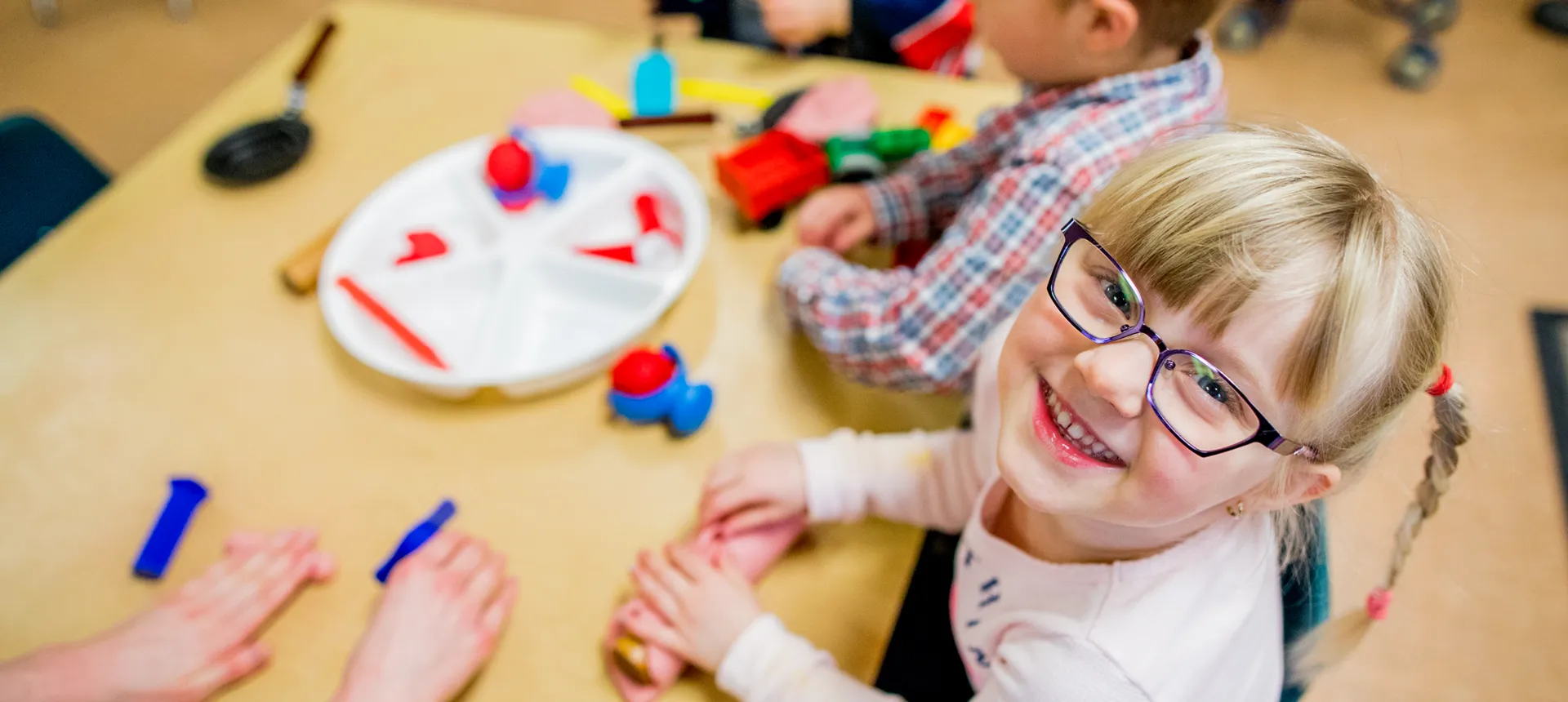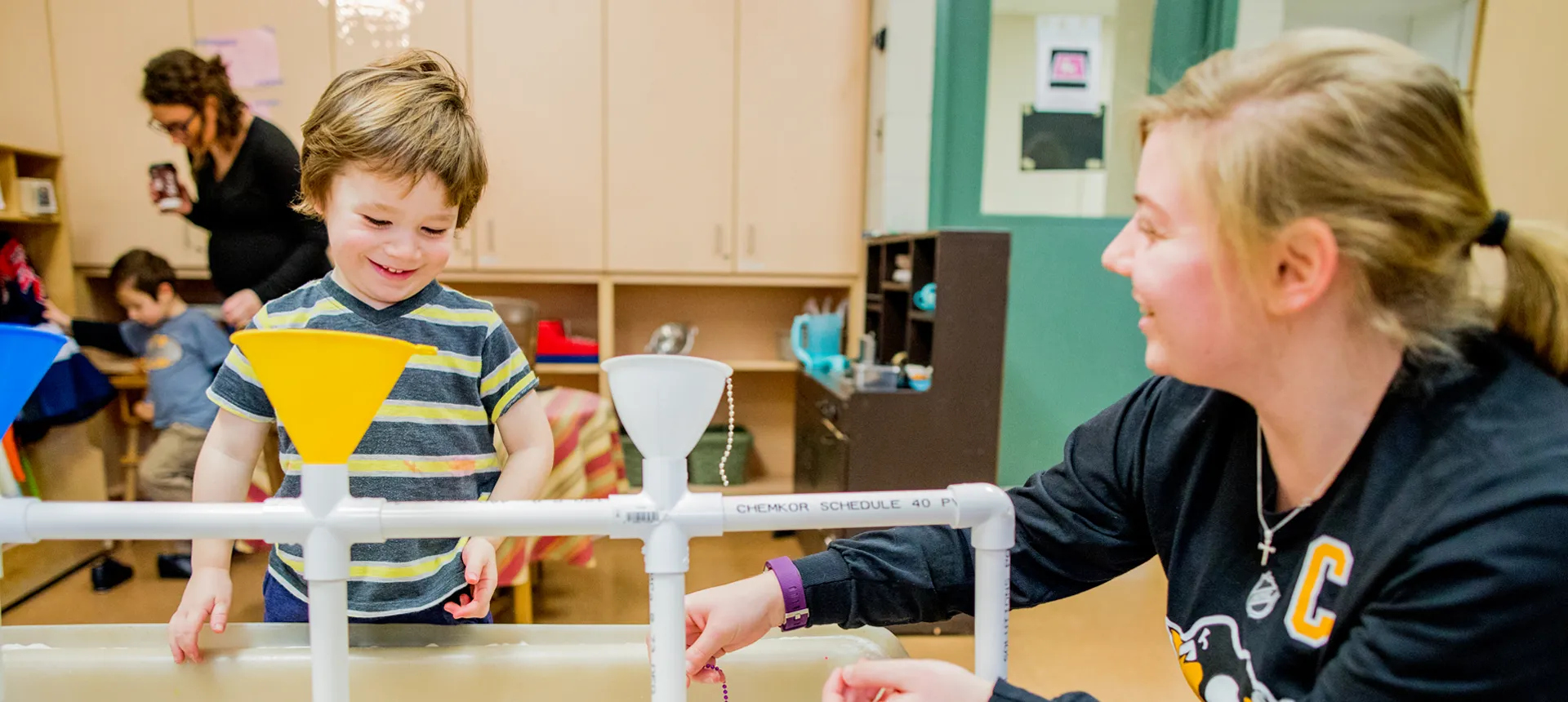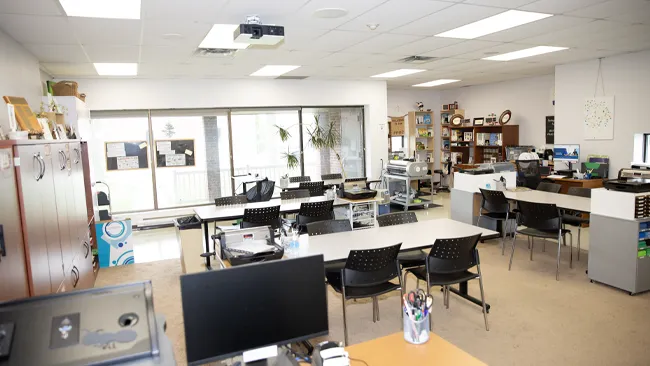

Early Childhood Education
CIP Code: 19.0709
Overview
Do you have a passion for making a difference in the lives of young children? Let our caring faculty support you as you gain the skills and competencies to become an Early Childhood Educator.
Our two-year program blends classroom theory and hands-on practical experience both in our beautiful new state of the art classroom and through community field placements. This dynamic combination gives students the knowledge and skills to work with young children aged 0-12 years in a variety of settings, while preparing them for this in-demand profession.
Students graduate with over 500 hours of practical experience through opportunities in child care centres (infant, toddler and preschool), drop-in centres, Indigenous child care centres, as well as kindergarten classrooms. Students also have the unique opportunity to complete a placement in our on-site EarlyON Child and Family Centre. Our on-site Parent & Professional Resource Centre offers valuable resources for curriculum planning, research, and professional development.
Sarnia - A Great Place to Study
Immerse yourself in Canadian culture in Sarnia's small community that cares.
Enjoy the beautiful city on the shores of Lake Huron, live affordably, and let us help you succeed in your future aspirations.
Admission Requirements
O.S.S.D. or equivalent with:
- Grade 12 English C or U
The admissions process is competitive and meeting the minimum academic requirements does not guarantee admission.
Lambton College reserves the right to alter information including admission requirements and to cancel a program or course at any time; to change the program curriculum as necessary to meet current competencies or changes in the job market; to change the pathways to third-party certification bodies; or to withdraw an offer of admission both prior to and after its acceptance by an applicant or student because of insufficient applications or registrations or over-acceptance of offers of admission. In the event Lambton College exercises such a right, Lambton College's sole liability will be the return of monies paid by the applicant or student to Lambton College.English Language Requirements
International applicants must demonstrate their knowledge and skills in English by submitting an English proficiency test. Please refer to our English Language Requirements webpage to determine which minimum scores are accepted.
Meeting the minimum English requirements does not guarantee admission. Students with higher English proficiency scores will receive priority in the admission assessment process. Not all students will qualify for EAP-3106 in place of the required IELTS or TOEFL test scores.
Costs
- Term 1 $7,743.38
- Term 2 $6,953.35
- Term 3 $7,653.35
- Term 4 $6,953.35
Total Cost of Program
Tuition fees are estimates and are subject to change each academic year. Fees do not include books (unless specifically noted), supplies or living costs.
Lambton College reserves the right to alter information including admission requirements and to cancel at any time a program or course; to change the location and/or term in which a program or course is offered; to change the program curriculum as necessary to meet current competencies or changes in the job market; to change the pathways third-party certification bodies; or to withdraw an offer of admission both prior to and after its acceptance by an applicant or student because of insufficient applications or registrations or over-acceptance of offers of admission. In the event Lambton College exercises such a right, Lambton College’s sole liability will be the return of monies paid by the applicant or student to Lambton College.
Additional Fees
Costs Associated with Placement
Students are responsible for providing the following documents or training at their own expense:
- Police Records Check with Vulnerable Sector
- Standard First Aid and CPR (Level C)
- Health Clearance
There may be additional fees incurred for classroom assignments and field placement.
Important Dates, Deadline & Late Fees
For additional information on registration dates, deadlines and late fees please refer to Registration Dates and Deadlines.
Student Fees
A student services fee is included in your tuition.
Health Insurance Coverage
Emergency medical insurance is mandatory for all international students at Lambton College. This includes students who are full-time and part-time and who are on a co-op. This insurance is provided by GuardMe - a third party insurance provider.
Technology Requirements
In order to keep pace with the requirements of each and every course in your program, Lambton College requires that each student have access to a laptop while studying at our college.
Labs & Equipment
Courses
Play Based Learning I - Creative Arts and Movement
This course introduces students to planning purposeful, creative experiences into their practical settings through hands on experiences in visual art, sensory bins, music and movement, students will learn to plan for children ages 0-12 years.
Child Development - The Early Years
This course provides a comprehensive study of child development. Topics include; various theories and theorists who have made the greatest contribution to our understanding of human development; the specific physical, language, social, emotional and cognitive developmental milestones that occur from conception through the formative years; the social/ecological context that impact development; a review of the ELECT document, how does learning happen, and current research that is relevant to the learning outcomes.
Health, Safety & Nutrition
This course will identify components of a safe and healthy environment which meets the requirements of current legislation and regulatory bodies. The health and nutritional needs of young children are identified, and the implementation of appropriate environments and practices are discussed.
Critical Thinking & Writing
This writing course challenges students to explore diverse opinions and articulate their own perspectives clearly and persuasively. Through critical reading, students will develop skills in synthesis, analysis, comparison, and response, striving for clarity and diplomatic expression of their opinions based on factual evidence. Students will practice various rhetorical strategies of persuasion and hone their writing to ensure precision and accuracy in their messages. This course lays the foundation for a subsequent research-writing course, equipping students with essential skills for academic success.
Foundations of ECE
This introductory course provides students with a foundational understanding of the early childhood education profession. Topics include historical influences, program quality indicators, professional & ethical responsibilities, play-based learning, communication strategies, and guiding behaviour. Students will also complete requirements to prepare for their first field placement.
General Education Elective
Infant & Toddler Curriculum
This course focuses on the developmental needs of the children placing special emphasis on observation of the developing child, from conception through toddler years. Appropriate care strategies, learning environment, activities, experiences and play materials for this group will be discussed.
Observation & Documentation
This course is based on the premise that observation is a critical element of the Early Childhood Educator's role. This course is an introduction to the developmental milestones from conception through age 12. Each unit of study will review a variety of observation and documentation tools and their effectiveness in developing curriculum in a variety of Early Childhood environments. Through guided observations, the student will gain experience using a variety of observation and documentation tools.
School Age Curriculum
This course will explore school-age curriculum and development and will prepare students to work with school-age children in full-day early learning kindergarten programs, before and after school programs, and recreation programs.
Play Based Learning 2 Storytelling & Literacy
This course explores the foundational role of play in supporting emergent literacy and language development in early childhood. Students will explore developmentally appropriate strategies, materials, and environments that support literacy across the curriculum. Topics include phonological awareness, storytelling, reading aloud, and integrating diverse literature. The course also focuses on engaging families in literacy development and applying provincial curriculum guidelines. Professional communication and reflective practice are emphasized to prepare students for success in early childhood education settings.
Field & Seminar I
Diversity
Dive into the heart of inclusive early childhood education. This course equips you with the tools to foster equity, challenge bias, and build culturally responsive relationships with children and families. Through real-world strategies, reflective practice, and anti-bias curriculum design, you'll learn to create welcoming spaces where every voice is valued.
Play Based Learning III - STEM
This course introduces the student to various types of, science, technology, math, blocks and woodworking experiences for children aged 0-12 years.
General Education Elective (Select 2)
General Education Elective (Select 2)
Pedagogy & Curriculum Models
This course provides a forum for in class and online discussions of specific philosophical questions and their application to Early Childhood Education settings today. An introduction to a variety of innovative curriculum approaches that can be applied to current Early Childhood Education programs will be undertaken. An examination of personal values, beliefs and practices and how they are related to the diverse theoretical approaches to Early Childhood Education will result in the development of a personal philosophy statement.
Field & Seminar II
Professionalism & Group Dynamics
This course prepares you to take on leadership roles in early childhood education by exploring professionalism, advocacy, and program management. You'll learn about legislation, budgeting, staffing, and quality assurance, while developing skills in communication, collaboration, and ethical decision-making. Through real-world case studies and group work, you'll gain the confidence to lead, support families, and advocate for quality child care.
Current Practices
An early childhood educator's commitment to "lifelong learning" implies an understanding that the ECE field continually changes. Keeping current allows early childhood educators to improve their practice. This course is designed to investigate the concepts of professionalism and advocacy as it relates to professional development and practice.
Working with Families
This course lays the foundation for identifying strategies for establishing positive family-teacher partnerships in early childhood environments. Respecting diverse family structures is critical to this course. Benefits and challenges to family-teacher relationships are examined. Strategies for establishing effective partnerships; creating welcoming environments; supporting new families; encouraging family involvement; maintaining effective verbal and written communication; and sharing guidance strategies will be examined.
Children with Diverse Abilities
Early Childhood environments include children with diverse abilities. This course prepares the student to meet these abilities through a variety of developmentally appropriate curriculum. Inclusionary practices and collaboration with families and community agencies will be analyzed.
Field & Seminar III
Contact
Centre for Global Engagement
LAMBTON COLLEGE SARNIA
1457 London Road
Sarnia ON N7S 6K4
After Graduation
Employment Opportunities

Our graduates have a diverse and dynamic set of skills for the evolving profession of Early Childhood Education. Our graduates have found rewarding employment opportunities in a variety of settings including child care centres, before and after school programs, with the school boards as teaching partners in the Kindergarten Program and early learning and family centres. With additional education, graduates can also work as resource teachers and educational assistants.
Accreditations & Certifications
Early Childhood Educator Certification
Graduates must apply to the College of Early Childhood Educators in order to practice as (or use the title of) Early Childhood Educators in Ontario.
Pathways
Build on your education and complete a college diploma or university degree in Ontario, Canada, or abroad
Want to see more Ontario transfers? Visit ONTransfer.ca.
Looking for Support After Graduation?
The International Graduate Services & Support Centre (GSSC) is a place dedicated to assisting International alumni as they seek employment and settle into Canadian life following graduation.
Post-Graduate Employment
International students who successfully complete their programs of study at Lambton College may be eligible to apply for a Post-Graduation Work Permit (PGWP) Program. This program allows students to gain valuable Canadian work experience.
A work permit under the PGWP may be issued for the length of the study program, up to a maximum of three years. A post-graduation work permit cannot be valid for longer than the student's study program, and the study program must be a minimum of eight months in length. The length and approval of the PGWP is determined solely by Immigration, Refugees and Citizenship Canada (IRCC).
Students must meet the eligibility requirements to apply for a post-graduation work permit.
Immigration Regulations & Changes
Immigration regulations are legislated by the Federal Government of Canada and are subject to change at any time without notice. Students are responsible for ensuring that they are in compliance with all Immigration, Refugees and Citizenship Canada regulations at all times during their studies and while in Canada. Lambton College staff are not authorized to provide advice or guidance on immigration-related matters. Prospective applicants and current students should consult the Immigration, Refugees and Citizenship Canada website or call the IRCC Call Centre at 1-888-242-2100 to answer or clarify any immigration-related questions or information.
Placement

Vaccinations & Police Record Checks
Students considering this program should be aware that there are field placement requirements. All placements require students to have police record checks. Proof of immunizations is also required and must be cleared through Passport to Placement.
Once you’ve applied, you can log in to mylambton.ca and view the program-specific Field & Clinical Placement Requirements. If you need information about these requirements before applying, please contact placementinfo@lambtoncollege.ca.
More Information
Student Responsibilities
- Course and program delivery schedules are proposed and subject to change for each intake.
- Students are required to bring their own laptop with wireless capability.
- Students are advised to bring an official copy of their most recent police clearance, driver's license, and vaccination record from their home country.

Technology Requirements
It is recommended that you use a Windows laptop for your coursework. While other devices like MacBooks or Chromebooks might work for some tasks, they may not support all the software required for your program. If you're unsure, check with your professors before buying.
Internet Speed Requirements
To get the best experience while learning online, we recommend having an internet connection with at least 40 Mbps download speed and 10 Mbps upload speed. This will help you use video calls, attend online lectures, and access other learning tools smoothly.
Because students live in many different areas, we can't suggest a specific internet provider. You'll need to check with local companies to find one that works best for you.
Laptop Requirements
In order to access the internet and virtually-delivered software and courseware, student laptops should include the following at a minimum. By meeting the following specifications, students will be equipped to access software and courseware on their laptop through the internet:
- Intel i5 8th Gen Processor or equivalent
- 8GB of RAM
- 100 GB HDD or more
- Webcam with a microphone
- Wi-Fi capable (802.11n/ac 5GHz)
- Windows 11 operating system
Mobile Device
Students will require a mobile device (smartphone) for:
- Accessing your digital student ID
- Using campus applications and services
Software
To ensure students are getting the most our of their classroom experience, some software will be required.
Lambton College has made this software easily accessible online. Students can leverage our Microsoft Office 365 software packages and services. In addition, much of the software you require for your courses will be available on demand for use on any device - on or off campus.

